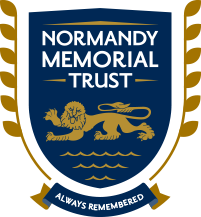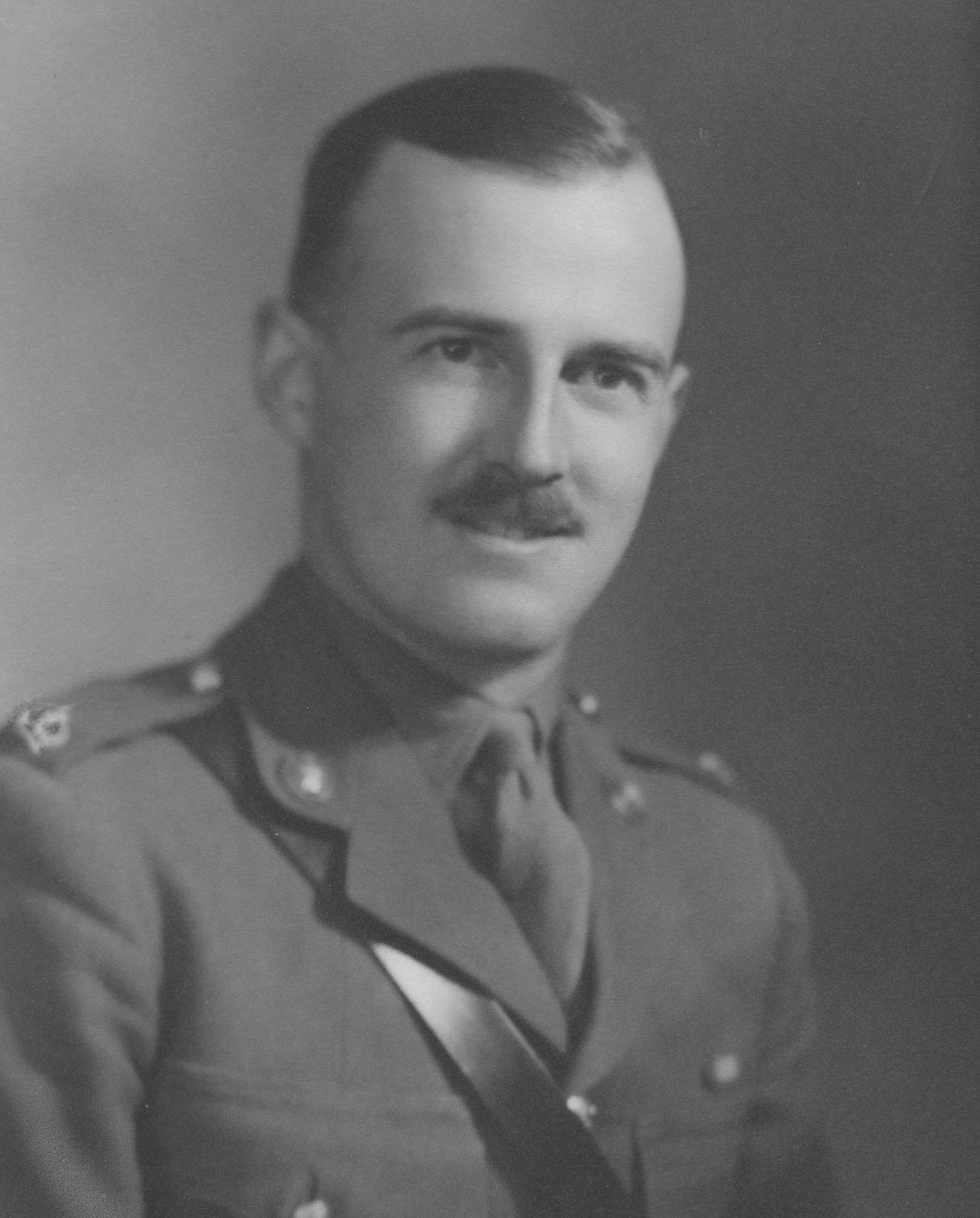
Robert "Robin" Heberden Barber
This story and photos are shared by the Trust with kind permission from Mavis Williams, Researcher and Joseph Clark, FindAGrave. Photos: Peter Barry Devers, FindAGrave
Robert Heberden Barbder, known as Robin, was the younger son of Walter Browne Barber and Violet Thomson. They lived in Beacon Hill, Hucknall, Nottinghamshire where Walter worked as a provincial solicitor who had built a comfortable law practice over the course of many years. They had two other children, Colin and Louisa. Walter was a keen sportsman, an avid bird watcher and also subscribed to the adage "the next best thing to a good day's fishing is a bad day's fishing". Robin followed in his father's footsteps as he had a lifelong passion for falconry. He trained and hunted goshawks, merlins and peregrines successfully and authored a small bibliography of falconry books.
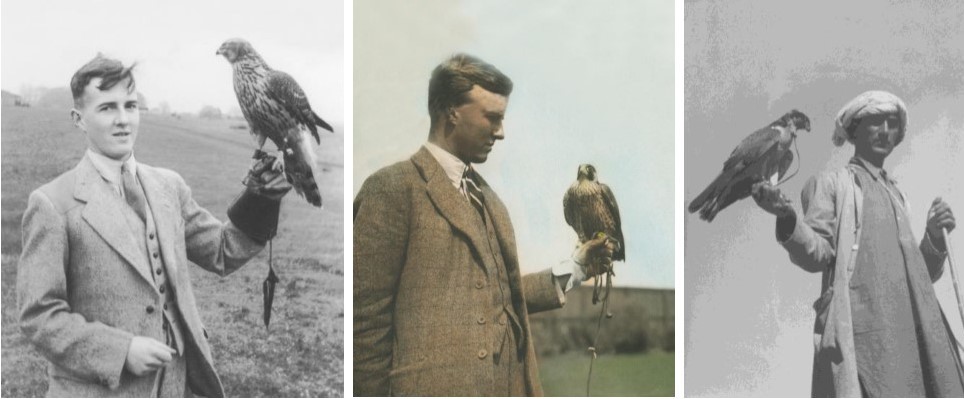
L-R: Robert with his goshawk; Robert with his peregrine; Robert continued his falconery in India
Robin was educated at Seacroft Preparatory School in Lincolnshire. At the age of thirteen, in September 1929 he entered Repton School in Derbyshire, a private boarding establishment for boys.
Shortly after leaving Repton, on August 31, 1934, he embarked on a career in the army. He entered the Royal Military College at Sandhurst and graduated from Sandhurst on December 17, 1935. He was commissioned a 2nd Lieutenant in the Northamptonshire Regiment on January 30, 1936.
In January 1937 he was sent to India, still the crown jewel of the British Empire, where he was first based at Razmak with the 1st Battalion. Fighting in Waziristan, now part of Pakistan, was to occupy most of his first year in India. While in India, Robin led an expedition to find the source of a Nepalese glacier but the weather prevented him from achieving his goal. It was at this time, while in Dinapore, that he applied for and was accepted as a Fellow of the Royal Geographical Society.
Robin's posting to India was cut short as the Nazi menace became more and more threatening in Europe. In April 1939 he sailed back to England for a short leave, slated to become ADC to the Governor of Bombay upon his return. On September 3rd, however, two days after Hitler's army invaded Poland, Britain declared war on Germany. Great Britain lacked experienced officers for the size the army had now attained so experienced men – and Robin's year under fire in Waziristan was more experience than many had – counted greatly.
He was sent to France with the 2nd Battalion, Northamptonshire Regiment as part of the British Expeditionary Force (BEF). After some months with the BEF he was recalled to Britain on January 5, 1940, prior to the start of the Battle of France on May 10th. He was posted to the 9th, then 50th Holding Battalions, followed afterwards on October 7, 1940, by an appointment to the General Staff in 12 Corps. Robin was promoted to a General Staff Officer, 3rd grade, as a Temporary Captain soon after.
In 1941, the Sussex Express of 6th May 1941 announced that he had got engaged to Eileen Mary Louisa Coombe, the only child of Captain Harvey Coombe of Oaklands Park, Battle, Sussex. They were married in Holy Trinity Church, Prince Consort Road, London on June 14, 1941.
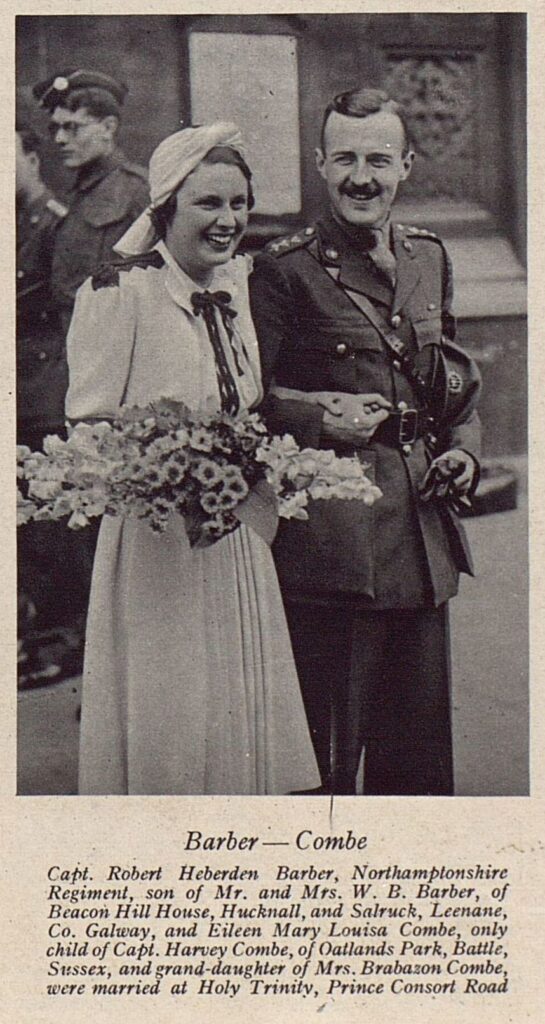
Source: Tatler, 25 June 1941
Shortly after his marriage Robin was transferred to the General Headquarters of the Home Forces in September 1941. From July to December 1942, he was based at the Home Forces HQ in the Aldershot District. Exemplary work there garnered him a promotion to Temporary Major and War Substantive Captain on October 14, 1942.
It was during this time that his brother, Colin, was killed when serving with 426 Battery, 107 (South Nottinghamshire Hussars Yeomanry) Regiment in North Africa. Ironically, he was killed on the 6th June 1942, the same day of the month as Robert would be in 1944.
Two months later, on December 17th, he was transferred to the epicenter of British war planning, the War Offices in London, working on General Ismay's staff. On several occasions Barber was called upon to inform Churchill on military matters. While with the General Staff in London Robin concentrated on German troop movements and other aspects of army intelligence. His careful analysis of military situations was appreciated and because of this Ismay selected him to accompany Churchill's party to the historic Quebec Conference in Canada. Held from August 17th to August 24th, 1943, the secret meeting of Roosevelt, Churchill, Mackenzie King, and Soong of China set major plans in motion for the invasions of France and Italy.
Upon his return from Canada, with his 2nd Battalion, Northamptonshire Regiment now in North Africa, Robin was posted to the 6th Battalion, Northamptonshire Regiment on October 18th. His stay there was short as plans for the invasion of France were well advanced. Robin was selected to be the commander of D Company, the East Yorkshire Regiment, and he took charge of them on February 7, 1944. They were sent to Scotland for months of rigorous training. Sometime in the weeks prior to D-Day Robin was offered a permanent office position on the General Staff. It was an important appointment and would have kept him in England, safely away from enemy fire. The job would certainly have advanced his career. Robin, however, quickly dismissed the idea before the offer was fully broached. He had been drilling and training his men of the East Yorkshire Regiment for months and felt his obligations lay with them, that it was his duty to lead them onto the beach.
It is likely that Robin was killed within 15 minutes of landing on Sword Beach. Hugh Temple Bone, who was in the same landing craft as Robin, wrote of the horrifying scenes of men torn apart by shrapnel, floating dead in the rising tide, bleeding from wounds they couldn't staunch. He was shocked and saddened at the death of Robin, his aide Jimmy Laurie, and so many other comrades. The images still remained hauntingly in his mind. In 2004, in a film about D-Day, Bone had this to say about Robin and the other men who died in the initial assault on Sword Beach: "The best ones die first because they are the brave ones, they're the ones who go forward, and, it's sad, it's very sad, but one has to face the fact that in war that's what happens."
Robin's death was reported in the Nottingham Journal of 15 June 1944.
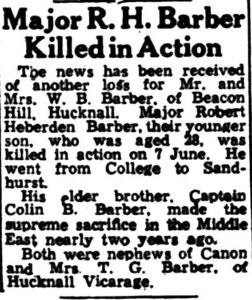
Robin is buried in the British Military Cemetery at Hermanville-sur-Mer, France a short distance from where he fell on Sword Beach.
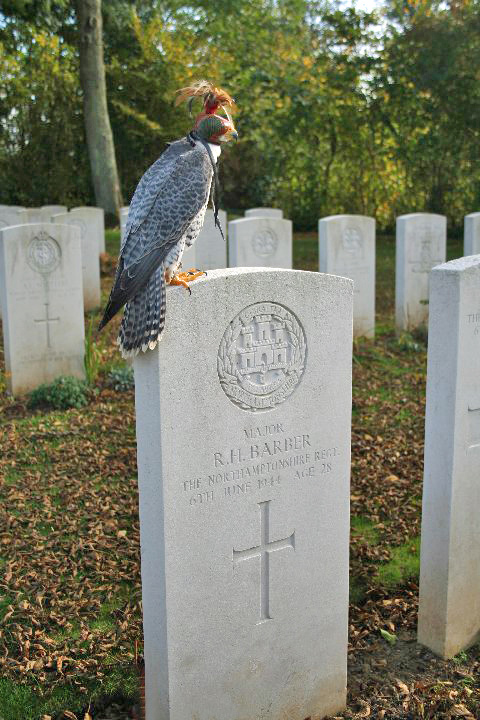
Robin Barber's grave with peregrine falcon
Robin left behind his wife and a daughter, Robin Barber (Wells), who he didn't get to meet, as she was born after her father passed away. Probate was granted to his widow, Eileen, and his sister, Louisa, on 10th September 1944.
FALLEN HEROES
ROBERT HEBERDEN BARBER
Army • MAJOR
Northamptonshire Regiment
DIED | 06 June 1944
AGE | 28
SERVICE NO. | 67170
FALLEN HEROES
ROBERT HEBERDEN BARBER
Army • MAJOR
Northamptonshire Regiment
DIED | 06 June 1944
AGE | 28
SERVICE NO. | 67170







